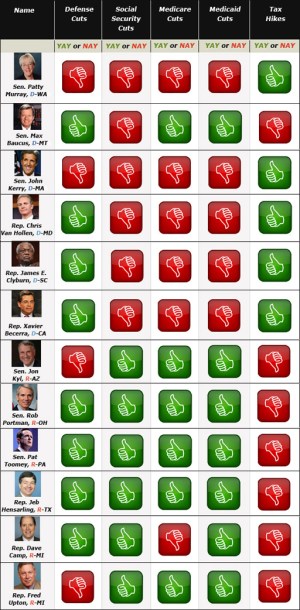What is the Deficit Super Committee?
A bipartisan, 12-member House-Senate committee on steroids charged with proposing $1.5 trillion of long-term deficit reduction by Thanksgiving. The joint committee was created by debt-ceiling legislation signed by President Obama on August 2. Three Republicans and three Democrats from each chamber will serve on the panel.
How does it work?
The 12 members, working feverishly behind the scenes, will struggle to come up with a bill to achieve $1.5 trillion or more in deficit reductions over the coming decade. While just about everything in the budget will be fair game, everyone knows that making big reductions will require cutting or slowing the growth of entitlement programs — including Social Security, Medicare, and Medicaid — and by raising tax revenues. If the committee reaches an agreement, its proposals will be guaranteed an up-or-down vote in the Senate, with no amendments allowed, by Dec. 23.
Who’s on the committee?
The 12 members have been appointed by congressional leaders, including House Ways and Means Committee Chairman Dave Camp, R-Mich.; Energy and Commerce Committee Chairman Fred Upton, R-Mich.; Rep. Jeb Hensarling, R-Tex; Sen. Patty Murray, D-Wash.; Sen. John F. Kerry, D-Mass.; Senate Finance Committee Chairman Max Baucus, D-Mont.; Senate Minority Whip Jon Kyl, R-Ariz.; Sen. Rob Portman, R-Ohio; Sen. Pat Toomey, R-Pa.; Assistant Democratic Leader James Clyburn, D-SC; Democratic Caucus Vice Chair Xavier Becerra, D-CA; and Budget Committee Ranking Member Chris Van Hollen, D-Maryland.
Where do they stand on Defense, Social Security, Medicare, Medicaid, Taxes?

What are the chances they can reach an agreement?
The prospects for a majority agreement are not great because of fundamental differences between the two parties over whether tax increases should be part of the mix. President Obama and congressional Democrats are calling for a balanced approach, including entitlement cuts and increased revenues by eliminating certain tax breaks and deductions. All six Republicans on the panel have signed no-new-taxes pledges, and they insist the primary focus should be on cutting government programs.
What if they don’t reach an agreement?
If the committee fails to agree or if Congress rejects its recommendations, that would trigger automatic, across-the-board cuts of $1.2 trillion, equally divided between defense and domestic programs. However, Social Security, Medicaid, veterans benefits, and other “essential” programs would be exempt from across-the-board cuts or “sequestration.”
What’s the best-case scenario?
The committee agrees to $1.5 trillion of savings, with far more in spending cuts than revenue increases (maybe along the lines of $3 to $4 of program cuts for every $1 of new revenue).
What’s the worst-case scenario?
Negotiations blow up shortly before Thanksgiving, partisan finger-pointing reigns supreme, the stock market tanks again, and Congress goes home for a somber, nail-biting holiday.






